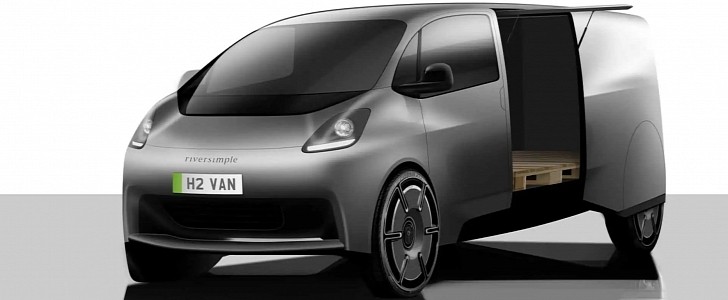Rivian seems to have developed an electric delivery van to help one of its major investors deliver goods with no emissions. Although DHL is no Amazon, it will also partner with a car company to achieve clean deliveries. However, it has two advantages over the internet giant: the first is that Riversimple is way cleaner than Rivian. The second is that Riversimple has already conceived a vehicle that could suit DHL’s needs, a hydrogen-powered van with to fuel cells.
Unlike the Rasa, the van still lacks a proper name. It will probably be revealed only by 2025. That’s when the new clean vehicle will hit the market. DHL has a third advantage over Amazon, and it has to do with Riversimple’s business model: it will not spend billions buying these vans when they are ready.
Riversimple will not sell a single car. Its idea is to let people use them as a service, even if the experience is pretty close to that of ownership. The company’s customers will pay a fee that covers the use, maintenance, insurance, licensing, and even refueling the cars with hydrogen, which may be a pretty interesting business model for a company such as DHL.
If any Riversimple vehicle presents a problem, DHL only has to return it and get another one immediately. It is Riversimple’s best interest that the vans are robust (so that they won’t break down), energy-efficient (to avoid costly refuelings), and safe and easy to repair (for insurance cost to be as low as possible). That brings all these concerns currently over the buyers’ shoulders to the manufacturer.
The best aspect of this business model is that raw material consumption is diminished to the minimum possible. Carmakers following it will not make money from selling more cars: they’ll earn more if they manage to keep their vehicles running as long as possible.
DHL must believe it can make the delivery business be much cleaner this way than it would if it bought thousands of electric vans. So much so that it will help Riversimple get “its first full-scale sustainable manufacturing facility in Wales” ready to start delivering cars in 2024. Production capacity will be 5,000 cars per year, which may seem relatively low. However, Riversimple says it can establish multiple factories closer to where customers are, creating jobs in these communities.
We’re still some years away from this first factory and from seeing the Riversimple van delivering stuff at DHL’s service. Still, it is comforting to know such a big company like DHL is not afraid to think outside the box for a more sustainable economy: one in which all stakeholders may gain something.
Riversimple will not sell a single car. Its idea is to let people use them as a service, even if the experience is pretty close to that of ownership. The company’s customers will pay a fee that covers the use, maintenance, insurance, licensing, and even refueling the cars with hydrogen, which may be a pretty interesting business model for a company such as DHL.
If any Riversimple vehicle presents a problem, DHL only has to return it and get another one immediately. It is Riversimple’s best interest that the vans are robust (so that they won’t break down), energy-efficient (to avoid costly refuelings), and safe and easy to repair (for insurance cost to be as low as possible). That brings all these concerns currently over the buyers’ shoulders to the manufacturer.
The best aspect of this business model is that raw material consumption is diminished to the minimum possible. Carmakers following it will not make money from selling more cars: they’ll earn more if they manage to keep their vehicles running as long as possible.
DHL must believe it can make the delivery business be much cleaner this way than it would if it bought thousands of electric vans. So much so that it will help Riversimple get “its first full-scale sustainable manufacturing facility in Wales” ready to start delivering cars in 2024. Production capacity will be 5,000 cars per year, which may seem relatively low. However, Riversimple says it can establish multiple factories closer to where customers are, creating jobs in these communities.
We’re still some years away from this first factory and from seeing the Riversimple van delivering stuff at DHL’s service. Still, it is comforting to know such a big company like DHL is not afraid to think outside the box for a more sustainable economy: one in which all stakeholders may gain something.










